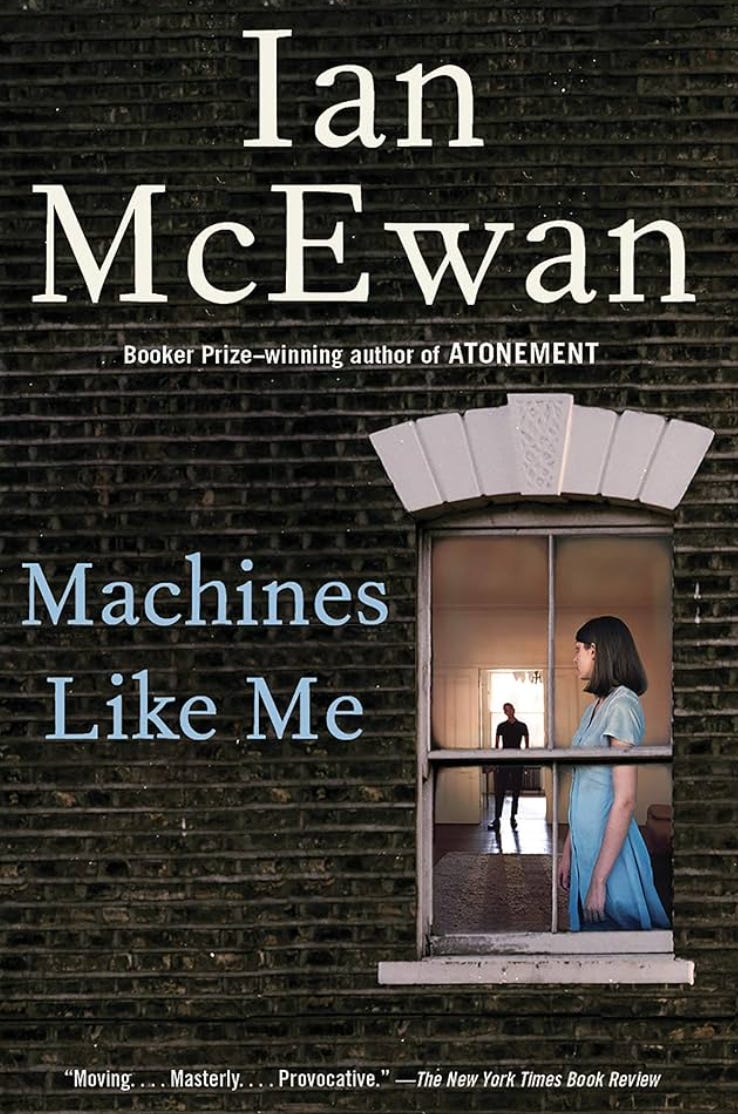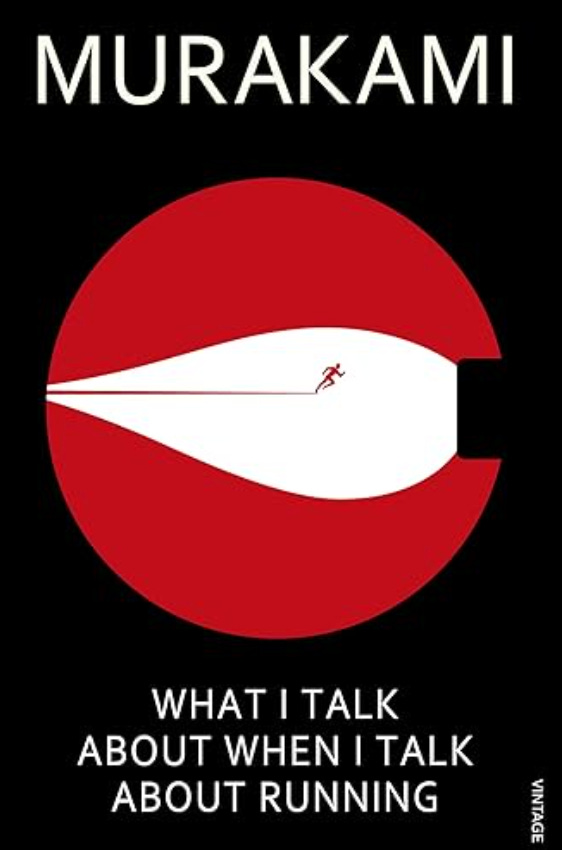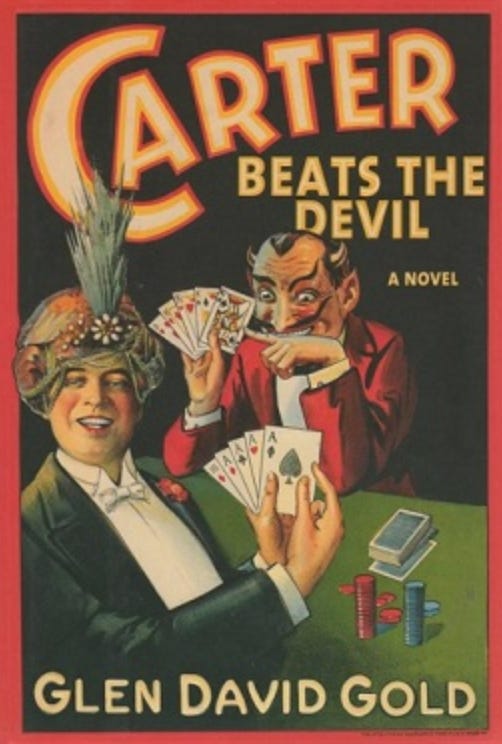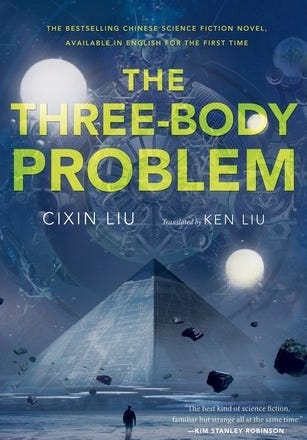For May 2024 we have uncovered some great works, so if you’re keen to look at what we’re keen to look at, let’s dive right in.
1. Machines Like Me, by Ian McEwan
Wow, oh wow. McEwan comes in hot with Machines Like Me, his 2019 masterpiece about -stay with us here - a robot, that his protagonist Charlie buys. McEwan’s Adam (that is the robot’s name) is certainly alive, but sits slightly within the uncanny valley. But this is not (and we can’t emphasize this enough) just a piece of sci-fi. In fact its barely sci-fi at all.
McEwan is the master of research and alongside the absolutely gripping story, you get thought provoking philosophy which really stretches you as a thinker, and a reader. What does it mean to be alive? How will machines affect our lives? What moral duties do we owe them, and them us? These questions are certainly of our time, and McEwan skillfully shows us we will have to deal with them. On the way we will be challenged by our own humanity. We thought his Saturday was insurpassible. We were wrong. McEwan might well be the greatest living author. Do yourself a favour, please - go and read it - it’s the best book we’ve found this year.
McEwan might well be the greatest living author. Do yourself a favour, please - go and read it - Machines Like Me is the best book we’ve found this year.
Oh and Look out for our impending review, next week. If you cannot wait, the Guardian carries a great piece on this novel.
2. What I talk about when I talk about running, by Haruki Murakami
We are often admonished to not judge a book by its cover, but this is the exception that proves the rule. Both the cover (it’s a man running over a brush that doubles as a pen, with a homage to the Japanese flag in the background, how much better can you get?) and the content of What I talk about when I talk about running are great.
Murakami, a barkeeper, come-author, come-marathon runner takes you on his journey through all these things in this semi-autobiographical, semi-anecdotal, semi-philosophical work which contains, along the way, his own stories about running. Murakami cluses us into his personal thoughts as to why he does it, and what he thinks he gains from it. He is at once in tune with his own desires, but never prescriptive. He’s not telling you what to do, he’s telling you his own feelings on the topic. He is naive, but curious about whether you would get anything out of his telling; but that wasn’t why the book was written - it was because he wanted to write it.
Murakami’s level of own self knowledge (‘as a child, I could never do anything because my teacher told me to do it, I had to want to do it myself’) is just so refreshing. His intelligence and desire to learn more about himself makes this an easy recommendation for anyone, whether or not they like the sport.
3. Carter Beats the Devil, by Glen David Gold
We are amazed this novel was ever attempted, let alone published. It had every ingredient required for it to go wrong. For a start, its very long, around 500 pages. It was a first novel for Glen David Gold. It is a historical fiction (danger!) about magicians (double danger!) and features cameos of various real-life figures, including the assassination of two American presidents. And for all that… it really works. It is a great find really, as it has utterly dropped off the radar.
Carter Beats The Devil follows the real life magician Charles Carter and his rise to success, interspersed with assassinations, mystery and intrigue. And the research is palpable - there can be no mistake, Glen David Gold loves Vaudeville - and he can really transport you to that world. Now, guaranteed, its work of earth-shattering philosophy - but it doesn’t try to be either. Suspend your disbelief, and give it a try - you will be glad you did.
4. The Three-Body Problem, by Cixin Liu
Yes, it is now a Netflix original series, and we have seen the show. Yes, we were turned on to it beforehand due to recommendations made to the site. And no - its not for us.
It just doesn’t work, largely because The Three-Body Problem attempts too much in the way that Sci-Fi often does, and overplays its own hand, to such an extent it is hard to engage in the world, and therefore it is not compelling. Its three central plots (hostile alien invaders! culture wars! A bizarre video game!) are so fractured it cannot be easily spun into a cohesive whole.
The historical narrative regarding the Chinese Cultural Revolution (downplayed in the Netflix series, but not so here) is probably the most interesting aspect of the book. The remainder appears more like a pastiche of Ready Player One and Recursion. This isn’t to deride it - there is certainly a time and a place for works like this, and those who are really willing to suspend their disbelief (and sci-fi diehards) have much to gain from it.
One thing that is to be really gained from Liu’s work is the questioning of the recieved wisdom that those from other worlds would be friendly, or even bonevalant to us. Liu spins that, arguing if we ever made contact with an alien species, there is no reason to expect them not to be hostile. In this way, it was thought provoking. Overall, however, the novel’s attempts to do too much, and be too clever in doing so, fail to make it compelling. Although we finished it, we cannot recommend it.
That’s It!
Thats enough discoveries for now - but we will be back with more vignettes into what we’ve found soon. In the meantime, stay tuned for our upcoming reviews, including into Machines Like Me (next week), poetry, and more each week at The Latent Book Club.
Before you go…
Check out more Latent Book Club finds:
Graham Greene’s Tabasco heat, in The Power and the Glory
Patrick Stewart’s stellar autobiography, Making It So
Richard Matheson’s devilishly readable I am Legend
Azar Nafisi’s brave Reading Lolita in Tehran
Ann Tyler’s cosily familial Dinner at the Homesick Restaurant
Or see of our full range of literary criticism in our archive.
Explore our collection of poetry:
Or read our entire back catalogue in our poetry archive.








